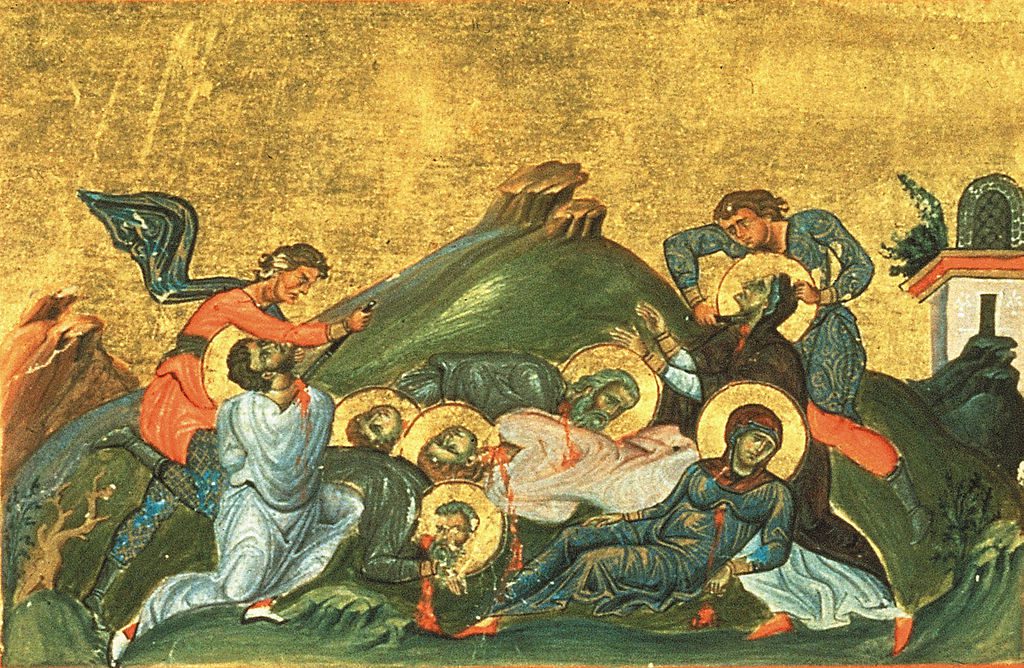If you were given two options to choose from, family or religion, which would you choose? It is a two-way road and it is a very narrow one, as both include sacrifices that most people would consider unthinkable. In the time of the Roman Empire, a faithful Christian woman by the name of Perpetua had to make this very decision, and it included her leaving behind a well-lived life, disownment, and imprisonment. The outcome of her passion led her to abandon a family and an infant child. Saint Perpetua was blessed with the honorable title of a martyr, as she held high her faith despite the consequences of claiming to follow Christianity.

Because Christianity was seen as a threat to the Roman Empire’s polytheistic religion, some of the early church’s followers faced imprisonment and in some cases, execution. One of the top crimes by the end of the first century was to claim that one was a Christian. Roman government officials grew suspicious of those who followed the Christian religion. They believed that Christians practiced gruesome things, such as ritual murder and incest. They believed that Christians were plotting against the Roman government. Aside from persecution and the chances of being arrested, early Christians faced many challenges, which included, disownment by their families, sacrifices, and disrespect from non-Christians.1

Vibia Perpetua, a young mother in her early twenties, was an early Christian arrested with a young group of catechumens, those who converted to the Christian faith. Her father had made many attempts to persuade her to disown her name as a Christian prior to her arrest. He had tormented her with many thoughts that only increased her anxieties of what was soon to come, but Perpetua’s love for God was stronger than her fears. She looked to her father, pointed to a vase, and said to him that, just like that object, she could not be called anything else other than what she was. In other words, she would proudly claim Christianity as her religion. Perpetua and the group were taken to prison. She sat constrained and afraid. Perpetua had never experienced such a place in her life. Her prior life outside of prison was full of opportunities; but now she was unable even to nurse her infant son, due to the separation. Once the group had moved to a more comfortable area of the prison, Perpetua spoke with her mother and brother, entrusting her son into their care. Although her fear of imprisonment in such a dark and gruesome place lingered, Perpetua felt a sudden burst of courage and did not mind being behind bars if it meant standing with her faith held high and God by her side. She knew the potential consequences of her actions and had visions of what the future held for her.2
Perpetua’s first vision was of a ladder that reached up to heaven, and God called to her from above, saying that He was waiting for her. However, He warned her of the serpent that sat on the ladder. The serpent waited to bite the ankle of those who climb up. In her vision, she fearlessly climbed the ladder knowing that nothing would stand between her and God. Through this vision, she knew that she would be martyred. Her second vision was of her brother Dinocrates, who had passed away at the age of seven because of a cancerous face tumor.3 In this vision, she saw that he was suffering, so she prayed for him. The following night, she had another vision in which he was well taken care of and was playing along with the other children of Heaven.4
The group was transferred to a military camp, where Perpetua had learned that they were sentenced to fight beasts in the arena. She had another vision that she and the group of Christian converts would not be fighting the wild animals held in the arena, though they were taking that form. She claimed that she was fighting the Devil and that she would be fighting a battle that she knew she would win, because she stood by her faith. In the military camp, the group had been treated harshly by guards. Perpetua looked them straight in the eye and told them about the glory they would have if the group were slaughtered while looking perfectly healthy. In hearing this, a banquet was thrown for the group to celebrate their last meal before their last moments, before their gruesome battle came into play. Still they were ridiculed for being Christians who would suffer the pain of wild beasts the following day.5
It was March 7, in 203 CE when they were scheduled to enter the arena in honor of the Emperor. The day and time had come for this group of Christians. They stood ready to face the beasts and chants of the Romans.6 The group was led to the arena where the many beasts awaited their arrival. At first, they were almost forced to dress in costumes of the Pagan gods and goddesses of Rome. Perpetua led the group of catechumens out of love for her Christian faith and refused to be submissive to the Romans’ demands.7 The beasts were released and the group of Christians met their end.

Alongside the group of those sent to the arena, Perpetua was accompanied by her slave, Felecity, who gave birth before being sent to fight the wild animals. Felecity was mentioned in Perpetua’s diary entries and the two women were supportive of each other. Like Perpetua, Felecity feared for her newborn daughter.8 Although she shared a mother’s fear for her child’s sake, Felecity’s next worry was that she would not be executed along with the group of Christians, because she was pregnant. It was rare for women to be executed, but the execution of an expecting mother was not allowed at all. If Felecity were to suffer from such a fate, she wanted to die and experience martyrdom with the rest of the young catechumens, who were dying for their faith,and not die alongside criminals who were being executed for having done wrong and committing crimes.9
The execution of women in the Roman Empire was extremely rare. For women from a higher status and education, such as Perpetua, it was even more rare.10 Vibia Perpetua had descended from a family with a great reputation and she had been raised with a strong education, which could be seen in her diaries of her last days in prison and before her martyrdom. She could have had the chance to watch her son grow up by renouncing her faith. She could have brought a good name to her family by turning to the Pagan religion. She could have pleased her father, who had begged her endlessly to denounce her faith in Christ. She could have said no to martyrdom and turned her face away from the thought of being called a Christian. She could have given into fear. She could have lived her life. She could have died old and not in her twenties, in an arena full of people and wild beasts thrashing and mocking her for her love for the Lord. She knew she could have stepped down, but she willingly stepped up. The fact that Saint Perpetua had suffered her fate so willingly shows that although she had given up a great life-style and opportunities that a majority of people would consider worth living for, it was worth it in her eyes to stand loyal to what she believed in. Perpetua wanted nothing more than to be called a Christian, and her passion for God and Christianity illustrates an image of how powerful love in the Christian faith can be. It takes a strong person, especially someone with a child, to lead a group of people in that situation and stand up for something so valuable.
- Erwin Goodenough, The Church In the Roman Empire (New York: Henry Holt and Company, 1931), 38. ↵
- Smith R. Scott and Christopher Francese, Ancient Rome : An Anthology of Sources (Indianapolis: Hackett Publishing Company, 2014), 258-259. ↵
- New Catholic Encyclopedia (Vol 11. 2nd ed.), 2003, s.v. “Perpetua and Felicity, SS.,” by E. Hoade. ↵
- Smith R. Scott and Christopher Francese, Ancient Rome : An Anthology of Sources (Indianapolis: Hackett Publishing Company, 2014), 259-262. ↵
- Smith R. Scott and Christopher Francese, Ancient Rome : An Anthology of Sources (Indianapolis: Hackett Publishing Company, 2014), 262-264. ↵
- Smith R. Scott and Christopher Francese, Ancient Rome : An Anthology of Sources (Indianapolis: Hackett Publishing Company, 2014), 257. ↵
- Sarah Gallick, The Big Book of Women Saints (San Francisco: Harper Collins, 2007), 77. ↵
- Encyclopedia of Children and Childhood: In History and Society (Vol. 2), 2004, s.v. “Perpetua, Saint,” by Susanna Elm. ↵
- Smith R. Scott and Christopher Francese, Ancient Rome : An Anthology of Sources (Indianapolis: Hackett Publishing Company, 2014), 263. ↵
- Encyclopedia of Children and Childhood: In History and Society (Vol. 2), 2004, s.v. “Perpetua, Saint,” by Susanna Elm. ↵



30 comments
Nicole Ortiz
I had never heard of the story of Saint Perpetua. This was such a well written article that gave many details about her life and death in so little words. Her story is one that should be recognized and well-known by many because not many people can choose their faith over their own family so Perpetua is an example of a true follower and and servant of God.
Sebastian Azcui
Wow. I cannot imagine being asked the question of family or religion. It is one of the hardest questions and I don’t know how to answer it. Vibia Perpetua stood up firmly and was so devoted to religion that she chose religion over family. Personally, I do not like this answer and do not support it. But, Vibia Perpetua is the one who stood firmly for her calling of God and with courage she overcame the fears she had faced and led a perfect christian life by which she became Saint Perpetua today.
Andrea Degollado
This article was very well written. Ive read several articles and I am completely amazed as to how much people hold on to their faith. I had never heard of the story of martyrdom and its honestly very admirable. She had so much faith that she was willing to walk into the lions den. This article was so interesting to read. Great job!
Michael Thompson
I have never heard of this story of martyrdom and it is interesting. The fact that she had no fear walking into a lions den, literally, is astonishing. Especially for a woman, and a person of her status. It’s just rare, like the article says. And though she died, her ability to hold on to her faith is admirable to say the least, and there aren’t as many acts like that today.
Aaron Peters
What a very informative article, Saint Perpetua’s dedication to her faith is really awe inspiring, having to choose between her family and her religion must have been very though, especially after she was martyred in such a horrible and brutal way. Her conviction to her faith is very admirable, even at risk of her own life, she did not renounce it.
Elizabeth Maguire
To be honest, I have never known of Saint Perpetua exsistance before reading this article. ‘Family or Religion?’ This is one of the most difficult questions to answer. But how Vibia Perpetua is the one who stood firmly for her calling of God and with courage she overcame the fears she had faced and led a perfect christian life by which she became Saint Perpetua today. Great work on the article.
Amelia Hew
To be honest, I won’t understand for why Saint Perpetua chose religion over her own family and even willing to leave her own son behind. On one hand, she was a irresponsible mother and daughter who left her own son and family behind just because of a religion. On the other hand, she possessed great courage and was willing to face death at such a young age for her faith in Christianity. It’s surprising on how Christianity was highly frown upon among the Romans and it’s a good thing that such practices won’t happen ever again in our world.
Isabella Torres
Being in the situation where you are forced to choose family or religion would be so difficult. Saint Perpetua’s faith in God was so strong that she didn’t even hesitate in her decision; she knew that there was really no choice for her. Even throughout the military camps, her faith remained strong and she continued to get the visions which carried her through these experiences. It is so difficult to imagine a world with no religious freedom at all, and it makes me very grateful to be able to have that. Saint Perpetua is definitely someone to look up to when it comes to having faith.
Rinnu Joy
Family or Religion ? This is one of the most difficult questions to answer. But Vibia Perpetua is the one who stood firmly for the calling of God and with courage she overcame the fear and led a perfect christian life by which she became saint Perpetua today. Perpetua’s decisions were so firm that she didn’t change it even when her father asked several times. She is someone that we need to look up to, to learn how to stand stern for what you wish.
Congratulations for the great work!
Nicholas Robitille
I was inspired by the faith and piety shown by Saint Perpetua even in the face of death. Even when faced with the possibility of renouncing her faith and reclaiming her place with her family and with society, she went willingly towards her death. Her martyrdom for her faith. I was surprised by the sheer hostility of the Romans towards Christianity and am glad to live in a world with much more religious freedom.